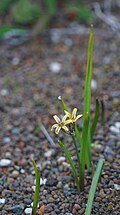| Triplet lilies | |
|---|---|

| |
| Ithuriel's spear (Triteleia laxa) | |
| Scientific classification | |
| Kingdom: | Plantae |
| Clade: | Tracheophytes |
| Clade: | Angiosperms |
| Clade: | Monocots |
| Order: | Asparagales |
| Family: | Asparagaceae |
| Subfamily: | Brodiaeoideae |
| Genus: | Triteleia Douglas ex Lindl. |
| Synonyms | |
| |
Triteleia is a genus of monocotyledon flowering plants also known as triplet lilies. The 16 species are native to western North America, from British Columbia south to California and east to Wyoming and Arizona, with one species in northwestern Mexico. However, they are most common in California. They are perennial plants growing from a fibrous corm roughly spherical in shape. They get their name from the fact that all parts of their flowers come in threes.
Taxonomy and systematics
The Angiosperm Phylogeny Group's 2009 revision placed the genus in family Asparagaceae, subfamily Brodiaeoideae (having previously placed treated Brodiaeoideae as a separate family Themidaceae). Other modern authors place it in the family Alliaceae. Both these families are in the order Asparagales.
There are currently 16 recognized species in Triteleia. One species, Triteleia ixioides, has five well-defined subspecies. Varieties and subspecies have been proposed within several other Triteleia species, but these are no longer widely accepted. Some common species that are now placed in genus Triteleia were formerly placed in genus Brodiaea, and as a consequence the word "brodiaea" has been incorporated into some of their common names.

| Image | Scientific name | Common Name | Distribution |
|---|---|---|---|
| Triteleia bridgesii | Bridges' brodiaea | on serpentine soils below 1,200 m (3,900 ft) in northern Sierra Nevada foothills and Klamath Range of northwestern California and southwestern Oregon | |
 |
Triteleia clementina | San Clemente Island triteleia | endemic to San Clemente Island, the southernmost of the Channel Islands of California |
 |
Triteleia crocea | Yellow triteleia | on serpentine soils at elevations of 650–2,200 m (2,130–7,220 ft) in the Klamath Range of northern California and southwestern Oregon |
 |
Triteleia dudleyi | Dudley's triteleia | at elevations of 1,200–3,500 m (3,900–11,500 ft) in the Sierra Nevada from Mono County southwards; possibly also in the San Gabriel Range of Los Angeles County |
 |
Triteleia grandiflora | large-flowered triteleia, Howell's triteleia, wild hyacinth | at elevations of 100–3,000 m (330–9,840 ft) in southern British Columbia, Washington, Oregon, Idaho, Montana, Wyoming, Utah, extreme northern California; isolated population in southwestern Colorado |
| Triteleia guadalupensis | jacinto del desierto | endemic to Guadalupe Island off the west coast of Baja California | |
 |
Triteleia hendersonii | Henderson's triteleia | at elevations of 100–3,000 m (330–9,840 ft) in southwestern Oregon and extreme northern California |
 |
Triteleia hyacinthina | white triteleia, white brodiaea, hyacinth brodiaea, fool's onion | common below 2,000 m (6,600 ft) in much of British Columbia, Washington, Oregon, California; also western Nevada and northern Idaho |
 |
Triteleia ixioides | prettyface, golden brodiaea | California north of the Transverse Ranges; the five subspecies have mostly separate distributions: |
 |
Triteleia laxa | Ithuriel's spear, grassnut, wallybasket | common below 1,500 m (4,900 ft) across from much of California; from the Tehachapi Mountains north along the western slopes of the Sierra Nevada and southern Cascade ranges, and in the Coast Ranges north from the Santa Lucia Mountains through the Bay Area to the Klamath Range as far as southwestern Oregon |
| Triteleia lemmoniae | Oak Creek triplet lily, Lemmon's star | on the Mogollon Rim southeast of Flagstaff, Arizona, with an elevation range of 980–2,340 m (3,220–7,680 ft) | |
 |
Triteleia lilacina | lilac prettyface | on volcanic hills and mesas at elevations of 70–200 m (230–660 ft) in the northern Sierra Nevada foothills of California |
 |
Triteleia lugens | Coast Range triteleia | two populations in the Coast Ranges of California, one around Pinnacles National Park and the other around the Sonoma and Napa valleys, north of San Francisco; possibly a third population in the San Gabriel Range of Los Angeles County |
 |
Triteleia montana | mountain triteleia | at elevations of 1,200–3,000 m (3,900–9,800 ft) in the central and northern Sierra Nevada and southern Cascade ranges of California |
 |
Triteleia peduncularis | longray triplet lily, long-rayed Brodiaea | in wet grassland and near vernal streams and pools on serpentine soils below 800 m (2,600 ft) in coastal counties of northern California |
| Triteleia piutensis | Piute Mountains triteleia | described in April 2014 from two populations in the Piute Mountains of the southern Sierra Nevada in Kern County, California, at elevations of 1,560–1,680 m (5,120–5,510 ft) |
- Triteleia × versicolor – Pinto triplet lily – a sterile hybrid believed to be T. hyacinthina × T. ixioides, recorded only from the type specimen collected in 1935 at Whaler's Knoll in Point Lobos State Park, Monterey County
A 2002 phylogenetic review of related genera found four clades within Triteleia that were all supported with 100 percent jackknife resampling values:
- Triteleia montana and Triteleia lemmoniae
- Triteleia peduncularis, Triteleia laxa, and Triteleia bridgesii
- Triteleia hyacinthina and Triteleia ixioides
- Triteleia grandiflora, Triteleia crocea, and Triteleia hendersonii
References
- ^ Kew World Checklist of Selected Plant Families
- Flora of North America, Triteleia Douglas ex Lindley, Edwards’s Bot. Reg. 15: under plate 1293. 1830.
- Biota of North America Program, 2013 county distribution maps, species of Triteleia
- Stevens, P.F., Angiosperm Phylogeny Website: Asparagales: Brodiaeoideae
- Pires & Sytsma 2002, p. 1351.
Sources
- Pires, J. Chris; Sytsma, Kenneth J. (August 2002). "A Phylogenetic Evaluation of a Biosystematic Framework: Brodiaea and Related Petaloid Monocots (Themidaceeae)". American Journal of Botany. 89 (8): 1342–1359. doi:10.3732/ajb.89.8.1342. PMID 21665737.
| Taxon identifiers | |
|---|---|
| Triteleia |
|
This Asparagaceae article is a stub. You can help Misplaced Pages by expanding it. |